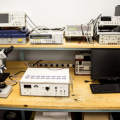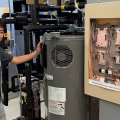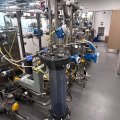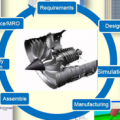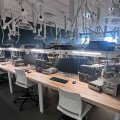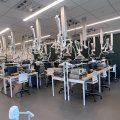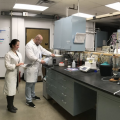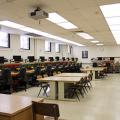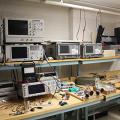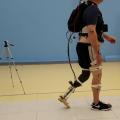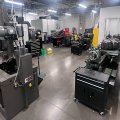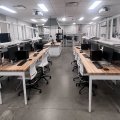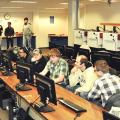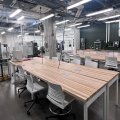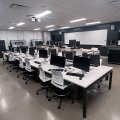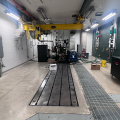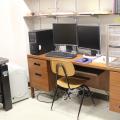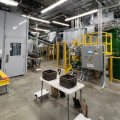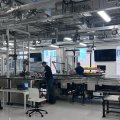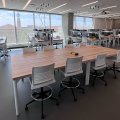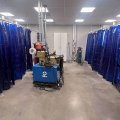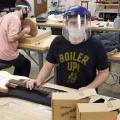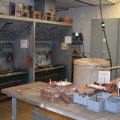Because our majors benefit from hands-on experiences to to assist in their learning, they need up-to-date labs and research facilities. Each department maintains and updates its learning facilities to provide real-world and technology experiences for their students. In addition, certain labs were created to focus on one type of research, led by faculty in the department.
Facilities
West Lafayette
The Adaptive Additive Technologies Lab (AATL), a collaborative research space focused on production of adaptive structures, utilizes additive manufacturing and novel manufacturing processes for production of smart sensors, piezo electrics, dielectric elastomer electroactive polymer actuators, integrated hydraulic components and hydraulic systems modeling.
Advanced Power Units and Renewable DistribUted Energy Lab (A_PURDUE)
Along with a variety of equipment for teaching lab-based undergraduate thermal and fluid science courses, the facility also features computer-controlled heating and cooling systems that mimic the types of equipment found in modern commercial buildings.
The Applied Thermofluids Laboratory (ATFL) at Purdue conducts applied research in thermal-fluids engineering.
The BoilerMAKER lab is a place where students can go to make their virtual designs real. This lab is available to all Purdue University students and teams. . This lab also has a six-person conference room (Knoy 155A) that is available for student and faculty use that includes a 60” LCD panel for displaying student projects / presentations.
Collaborative robots are robots that work synergistically with humans and with other agents. Example application areas include emergency response robots that extend the search for survivors into dangerous or inaccessible areas; manufacturing robots that provide precision and persistence to dull, dirty, dangerous tasks; and home assistance robots, including Internet-of-Things technologies, that improve user convenience, reduce the burdens of daily living, and enhance quality of life.
The Purdue Continuous Process Laboratory is an advanced model of industrial process controls configured in a real-world application.
The Product Lifecycle Management Center is an interdisciplinary research center at Purdue University. The center fuses the talents and resources of experts from the Purdue Polytechnic Institute, the colleges of Engineering and Science and Krannert School of Management into a single focused entity to serve as an industry resource. Through high technology-readiness-level (TRL) research, training and implementation of product lifecycle management, the center provides its partners in business and industry with knowledge and tools to improve their bottom line. Through the center, companies and employees have access to certificate programs in Product Lifecycle Management, Model-based Definition, and Digital Technical Data Packages. These programs provide instruction that bridges the gap between management’s strategy for PLM and software-specific training.
 The Digital/Biomedical Embedded Systems & Technology (D-BEST) Laboratory, founded and directed by Dr. Miad Faezipour, is affiliated with the School of Engineering Technology, Polytechnic Institute, at Purdue University. This research lab aims to advance the integration of biomedical signal/image processing, deep/machine learning and AI in healthcare research areas with digital/embedded system designs and implementations. D-BEST Lab is located in Dudley Hall 5370.
The Digital/Biomedical Embedded Systems & Technology (D-BEST) Laboratory, founded and directed by Dr. Miad Faezipour, is affiliated with the School of Engineering Technology, Polytechnic Institute, at Purdue University. This research lab aims to advance the integration of biomedical signal/image processing, deep/machine learning and AI in healthcare research areas with digital/embedded system designs and implementations. D-BEST Lab is located in Dudley Hall 5370.
The Margaret R. Taber Microcomputer Lab provides students with an environment where they are able to explore as well as develop the skills and knowledge in order to create new processes, new innovations, new technology in order to increase efficiency and performance.
This laboratory provides professional grade instrumentation and test facilities. Upper division students design, build and evaluate electronics systems here. In the consumer power section, microcontrollers drive switching and analog power electronics. Loads include motors, loud speakers and light displays, up to ½ kilowatt.
The Experimental Mechanics Laboratory has approximately 1,200 square feet and accommodates 16-24 students. The lab is primarily used for classroom instruction and for student projects ranging from required undergraduate class‐related projects to graduate student and faculty research.
Kilaz research group focuses on sustainable energy and alternative liquid transportation fuels. We investigate fuel chemical composition utilizing state-of-the-art instruments, such as two-dimensional gas chromatographs. Our capabilities include, but are not limited to, fuel property testing following ASTM approved methods.
The Industrial Internet of Things (IIoT) Lab is the “gateway” laboratory for introducing industrial control systems, smart manufacturing, Industry 4.0, and networking concepts.
The Gateway Fundamentals Lab provides students with an environment where they are able to explore and develop skills and knowledge allowing for the creation of new processes, innovations, and technology with a focus on increasing efficiency and performance.
Considered by many to be the best fluid power teaching facility in the United States, the lab provides the ideal setting for education and research in fluid power (hydraulics and pneumatics), machine controls and data acquisition. State of the art lab equipment allows students to have hands‐on experience in fluid power, learning the basics of hydraulic and pneumatic components, studying hydraulic, pneumatic and electric circuits, computer simulation and data acquisition.
The High Frequency Milling Lab provides students with an environment where they are able to explore as well as develop the skills and knowledge in order to create new processes, new innovations, new technology in order to increase efficiency and performance.
The research at HIRoLab is focused on human-centered robotics including the development of assistive and rehabilitation devices for enhanced agility, improved mobility, and augmented performance.
The Integrated Sensing and Smart Solutions Lab is an interdisciplinary facility at Purdue Polytech, Purdue University.
Our key theme is to Advance discoveries to deliver solutions in Sustainability, Safety and Healthcare Applications.
We focus on four different thrusts.
1. Understand and characterize the intelligent (sensing/recognition) behavior of biological systems.
Organic electronics is a branch of electronics that is based on conducting and semiconducting polymers and molecules. Unlike conventional inorganic materials, organic electronic materials are constructed from organic (carbon-based) small molecules or polymers. Their benefits include physical flexibility, bio compatibility, large area and low cost fabrication.
The Machining/Fabrication Lab provides instruction and research activities supporting manual machine and G-Code Computer Numeric Controlled (CNC) machines to produce parts in a simulated industrial setting
The Materials Testing Laboratory equipment enables students to learn best practices to determine proper material usages in engineering design and industrial applications.
Within this lab, students are provided with equipment to characterize all aspects of a given part, including size, shape, feature location, surface roughness, etc…
The Multidisciplinary Design Laboratory (MDL) is aiming to 21st century industrial product innovation and development. It provides a platform for innovative multidisciplinary product design. The MDL gives students career skills training and lets them share creative ideas, stretch out-of-box thinking, exercise their talents and prototype their dream based on real-world experience and requirements. The MDL supports MET 400 (Capstone Design). It also provides research and development facilities for MET doctoral and master’s students.
The Polymer Processing Lab provides students with an environment where they are able to explore as well as develop the skills and knowledge in order to create new processes, new innovations, new technology in order to increase efficiency and performance.
The ECET Power Lab provides students with an environment where they are able to explore as well as develop the skills and knowledge in order to create new processes, new innovations, new technology in order to increase efficiency and performance.
The Powertrain Technology Laboratory (PTL) is an instructional facility within Purdue Polytechnic for teaching students the principles of internal combustion engines, electrified powertrains, and alternative fuels. Students taking courses in this lab will gain first-hand experience with running engines in a professional test cell environment. Students will post-process their data to analyze engine performance.
The Scanning Probe Microscopy (SPM) lab provides student experience including imaging of surface topography, measurements of material characteristics and manipulation at the nanoscale. The Bruker Innova SPM allows for a variety of SPM modes with resolutions of 0.5nm in X/ Y and 0.1nm resolution in the Z axis. The system is used for teaching and research activities.
The Metal Castings Laboratory provides instruction and research in casting and solidification processing of metals and alloys. The lab provides students opportunities to put theory into practice and experience firsthand how to make castings and use simulation tools for improving the quality of castings.
The Purdue Smart Learning Factory is a microcosm of modern industrial manufacturing environments, demonstrating end-to-end production, utilizing the latest technologies of Industry 4.0. The facility is intelligently monitored and controlled by IOT connected devices, supported by local and cloud AI and machine learning algorithms, and protected by IT/OT cybersecurity solutions.
The SOET Open Projects Lab provides 24 fully equipped stations for students to work on ECET program relevant tasks such as homework, lab assignments and projects. Each station is furnished with soldering equipment and essential test equipment including a digital oscilloscope, a low voltage multi-output DC supply, a digital multi-meter and a function generator.
The welding lab is a metal fabrication area providing students exposure to common fabrication and joining processes and sourcing metal forming services to SOET senior design teams.
The Fabrication Lab is where students use principles in engineering technology to design and build guitars, loudspeakers, educational toy kits and furniture.
Purdue Polytechnic in Indianapolis
This lab supports experiential activities in circuit analysis, analog electronics, and instrumentation. Each lab station includes a standard suite of equipment, including a power supply, function generator, multimeter, digital oscilloscope, and a computer with industry standard software such as LabVIEW, Multisim, and Matlab.
This lab supports experiential activities in digital electronics, electric machines, industrial controls, and programmable logic controllers (PLCs). Each lab station includes a standard suite of equipment, including a power supply, function generator, multimeter, digital oscilloscope, and a computer with industry standard software. Three-phase power is also available in the lab.
This lab supports experiential activities for capstone design projects. It also houses large equipment, including robots, a batch skid, and conveyor systems. Each lab station includes a computer with industry standard software.
This lab supports experiential activities in introductory and advanced embedded microcontroller systems. Each lab station includes a computer with industry standard software.

